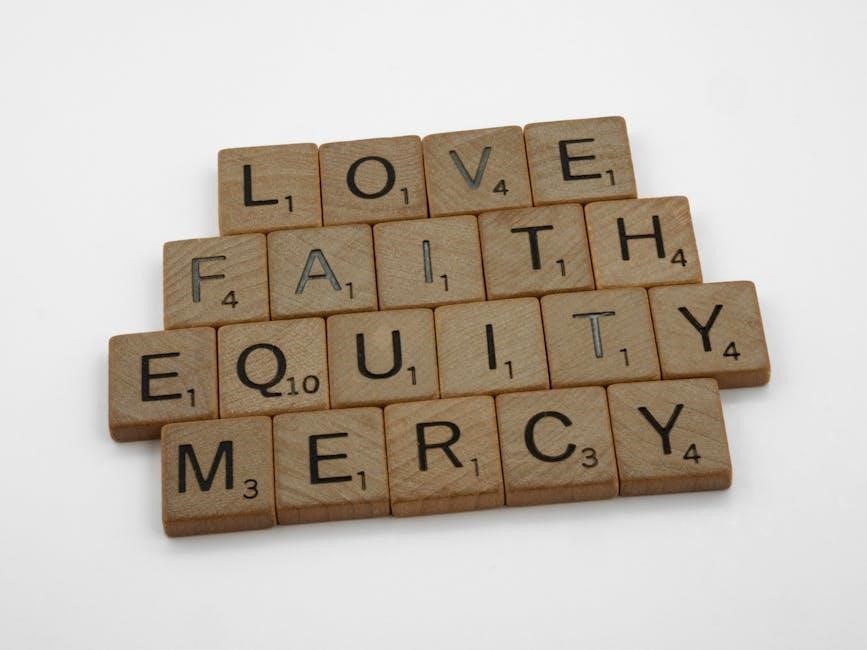pdf of just mercy
Just Mercy by Bryan Stevenson is a powerful exploration of justice, redemption, and mercy in America’s criminal justice system. Available as a PDF, the book offers a detailed account of Stevenson’s legal battles, highlighting systemic injustices and the fight for equality. Readers can download the PDF to access the full narrative, including the pivotal case of Walter McMillian and the founding of the Equal Justice Initiative.
Overview of the Book
Just Mercy by Bryan Stevenson is a compelling memoir that delves into the deep-seated injustices of America’s criminal justice system. The book chronicles Stevenson’s journey as a young lawyer fighting for the rights of marginalized individuals, particularly Walter McMillian, a wrongly convicted Black man on death row. Through stirring narratives, Stevenson exposes racial bias, poverty’s impact on legal outcomes, and the flawed death penalty system. Available as a PDF, the book offers a digital format for easy access, ensuring its critical message reaches a broader audience. Stevenson’s work through the Equal Justice Initiative underscores the need for mercy and reform in a system often devoid of justice.
Author Bryan Stevenson
Bryan Stevenson, a renowned legal advocate, is the author of Just Mercy and founder of the Equal Justice Initiative. Born in a poor African American community in Delaware, Stevenson’s early life shaped his commitment to fighting injustice. As a young lawyer, he dedicated his career to defending marginalized individuals, particularly those on death row. His work has led to the overturning of numerous wrongful convictions, earning him national acclaim. Stevenson’s narrative in Just Mercy offers a personal and profound perspective on America’s criminal justice system, emphasizing the need for mercy and equality. His efforts continue to inspire systemic change and public awareness.
Key Themes: Justice, Redemption, and Mercy
The central themes of Just Mercy revolve around justice, redemption, and mercy, offering a profound critique of America’s criminal justice system. Bryan Stevenson highlights how systemic injustices disproportionately affect marginalized communities, emphasizing the need for true justice. Redemption is explored through personal stories, such as Walter McMillian’s wrongful conviction, showcasing the human capacity for forgiveness and second chances. Mercy serves as a call to compassion, urging society to recognize the dignity of all individuals. These themes intertwine to create a compelling narrative that challenges readers to confront inequality and advocate for a more equitable system. Stevenson’s work underscores the transformative power of empathy and justice.

The Central Plot and Characters
Just Mercy centers on Bryan Stevenson’s legal battles, particularly the wrongful conviction of Walter McMillian, a Black man sentenced to death in Alabama. Stevenson’s relentless advocacy unfolds against the backdrop of systemic racism and injustice, showcasing his dedication to fighting for the marginalized.
The Case of Walter McMillian
Walter McMillian, a Black man from Monroe County, Alabama, was wrongly convicted of murder and sentenced to death. The PDF of Just Mercy details how Bryan Stevenson, founder of the Equal Justice Initiative, took on McMillian’s case, revealing deep-seated racial bias and procedural injustices. Despite evidence proving McMillian’s innocence, the prosecution relied on questionable testimony and withheld critical information. Stevenson’s advocacy exposed the flaws in the criminal justice system, ultimately leading to McMillian’s exoneration. This case became a pivotal moment in Stevenson’s career, underscoring the need for systemic reform and highlighting the importance of mercy in a broken legal framework.
Monroe County, Alabama: Setting and Significance
Monroe County, Alabama, serves as the backdrop for much of Just Mercy, its history and culture deeply intertwined with the injustices explored in the book. The PDF version of the text highlights how the county’s racial tensions and economic disparities created an environment conducive to systemic bias. The setting of Monroeville, famously associated with To Kill a Mockingbird, contrasts sharply with the real-life struggles of Walter McMillian and others. The county’s significance lies in its representation of broader American issues, making it a microcosm of the nation’s ongoing battle with racial inequality and flawed criminal justice practices, as detailed in the PDF of Just Mercy.
The Role of the Equal Justice Initiative
The Equal Justice Initiative (EJI), founded by Bryan Stevenson, plays a central role in Just Mercy as a legal advocacy group dedicated to representing marginalized individuals. The PDF version of the book highlights EJI’s mission to challenge unfair practices within the criminal justice system, particularly for the poor and people of color. Despite being underfunded and overwhelmed with cases, EJI remains committed to seeking justice for those wrongly condemned or neglected by the system. Stevenson’s work through EJI underscores the organization’s vital role in advocating for mercy and reform, making it a cornerstone of the narrative in Just Mercy.

Bryan Stevenson’s Journey
Bryan Stevenson’s journey as a legal advocate began with his early motivation to fight for justice, leading him to found the Equal Justice Initiative (EJI). The PDF highlights his relentless dedication to challenging systemic inequalities and advocating for mercy in the criminal justice system.
Early Life and Motivation to Become a Lawyer
Bryan Stevenson’s early life in a poor African American community in rural Delaware deeply influenced his commitment to justice. Growing up in a segregated society, he witnessed firsthand the inequalities faced by marginalized groups. These experiences instilled in him a strong sense of empathy and a desire to challenge systemic racism. Stevenson’s journey to becoming a lawyer was driven by a profound belief in the power of the legal system to effect change. His upbringing and personal encounters with injustice laid the foundation for his future work as a legal advocate for the oppressed.

Founding the Equal Justice Initiative
Bryan Stevenson founded the Equal Justice Initiative (EJI) to address the dire need for legal representation for marginalized communities, particularly those on death row. EJI’s mission was to challenge racial bias, poverty, and unfair sentencing in the criminal justice system. Stevenson’s vision was to create an organization that would not only provide legal aid but also advocate for systemic reforms. Despite initial funding challenges, EJI grew into a powerful force, highlighting cases like Walter McMillian’s and bringing national attention to the flaws in capital punishment. The PDF version of Just Mercy details EJI’s early struggles and its transformative impact on justice in America.
Challenges Faced as a Legal Advocate
Bryan Stevenson faced immense challenges as a legal advocate, including underfunding and overwhelming demand for his services. Early in his career, his legal defense center struggled financially while handling numerous cases of wrongful convictions and death row inmates. Stevenson also encountered systemic racial bias and political resistance, particularly in cases like Walter McMillian’s, where conspiracy and injustice were deeply entrenched. Despite these obstacles, Stevenson’s unwavering commitment to justice and mercy drove him to challenge flawed legal systems. The PDF version of Just Mercy vividly captures these struggles, highlighting the emotional and professional toll of advocating for marginalized communities in a system often stacked against them.

Systemic Injustices in the U.S.
Just Mercy exposes deep-rooted racial bias, flawed death penalty systems, and poverty’s disproportionate impact on legal outcomes, revealing entrenched inequalities in America’s criminal justice framework.
Racial Bias in the Criminal Justice System
Just Mercy vividly illustrates the pervasive racial bias in America’s criminal justice system, particularly affecting Black communities. Stevenson highlights how systemic racism leads to unfair treatment of minorities, from policing to sentencing. The book exposes how racial prejudice influences jury decisions and judicial outcomes, disproportionately condemning people of color to harsh penalties. Through cases like Walter McMillian’s, Stevenson reveals how racial stereotypes and bias perpetuate injustice. He argues that understanding this bias is crucial to dismantling systemic inequality and achieving true justice. The PDF version of Just Mercy provides a detailed exploration of these issues, urging readers to confront and address racial disparities in the legal system.
The Death Penalty and Its Flaws
Just Mercy critically examines the death penalty, revealing its deep flaws and moral failures. Stevenson argues that capital punishment disproportionately affects marginalized communities and is often applied arbitrarily. He exposes how inadequate legal representation, racial bias, and procedural errors lead to wrongful convictions. The book highlights cases where innocent individuals, like Walter McMillian, face death sentences due to systemic failures. Stevenson advocates for abolition, asserting that the death penalty undermines justice and perpetuates inequality; The PDF version of Just Mercy provides a compelling case against capital punishment, urging reforms to protect human rights and ensure fairness in the legal system.
Poverty and Its Impact on Legal Outcomes
Just Mercy sheds light on how poverty gravely impacts legal outcomes, perpetuating systemic injustice. Stevenson reveals that many defendants cannot afford adequate legal representation, leading to poor defense strategies and unjust convictions. The book highlights how underfunded public defender systems and overburdened courts disproportionately harm low-income individuals. Stevenson’s legal defense center faced financial struggles while fighting for marginalized clients, showcasing the stark reality of resource inequality. Poverty, combined with racial bias, creates a cycle of disadvantage, as seen in cases like Walter McMillian’s. The PDF version of Just Mercy underscores how economic disparities undermine the fairness of the legal system, emphasizing the need for reform to ensure equal justice for all.

Key Cases Highlighted in the Book
Just Mercy details the wrongful conviction of Walter McMillian, a Black man sentenced to death for a murder he didn’t commit, and Stevenson’s relentless fight for his exoneration. The PDF version highlights this case and others, exposing deep flaws in the justice system and the disproportionate impact on marginalized communities. Stevenson’s work through the Equal Justice Initiative is central to these stories, illustrating the urgent need for reform and the power of advocacy in seeking justice for the oppressed.
The Story of Walter McMillian
Walter McMillian, a Black man from Monroe County, Alabama, was wrongly convicted of murder and sentenced to death. The PDF version of Just Mercy details how McMillian’s case was marred by racial bias, unreliable eyewitness testimony, and withheld evidence. Bryan Stevenson, representing McMillian, uncovered the deep-seated injustices in the legal system that led to his wrongful conviction. Stevenson’s tireless efforts ultimately led to McMillian’s exoneration, revealing the flaws in the death penalty system and the systemic racism embedded in American criminal justice. McMillian’s story is a heart-wrenching example of how the system fails the marginalized, emphasizing the need for reform and mercy.
Other Notable Cases from the Book
Beyond Walter McMillian, the PDF of Just Mercy highlights several other striking cases that showcase systemic injustices. Stevenson recounts his work with individuals like Lonnie Joe Dutton, who faced a flawed legal system due to poverty and inadequate representation. Another notable case involves a mentally ill client denied proper medical care, illustrating how societal neglect exacerbates judicial failures. These stories, detailed in the PDF, underscore the widespread issues of racial bias, poverty, and lack of access to fair legal representation. Each case serves as a testament to Stevenson’s relentless advocacy and the urgent need for criminal justice reform in America.
The Emotional Toll on Clients and Lawyers
The PDF of Just Mercy vividly captures the emotional toll faced by both clients and lawyers in the criminal justice system. Bryan Stevenson shares deeply personal struggles, revealing how the weight of injustice affects not only the accused but also those fighting for their rights. Clients like Walter McMillian endure immense psychological trauma, while lawyers grapple with the moral and emotional strain of advocating for marginalized lives. Stevenson’s narrative, available in the PDF, highlights the profound mental and emotional challenges faced by all parties involved, emphasizing the human cost of systemic inequality and the resilience required to confront it head-on every day.

The Film Adaptation
The Just Mercy film adaptation, starring Michael B. Jordan as Bryan Stevenson, faithfully captures the book’s essence, bringing its powerful story of justice and redemption to life on screen.
Michael B. Jordan as Bryan Stevenson
Michael B. Jordan’s portrayal of Bryan Stevenson in the film adaptation of Just Mercy is both captivating and authentic. He brings depth and nuance to Stevenson’s character, highlighting his unwavering dedication to justice and compassion. Jordan’s performance captures the emotional weight of Stevenson’s journey, from his early days as a legal intern to his pivotal role in the Walter McMillian case. The actor’s ability to convey vulnerability and determination ensures that Stevenson’s story resonates powerfully with audiences, making him a compelling on-screen representation of the real-life legal advocate. Jordan’s commitment to the role further amplifies the book’s message of mercy and redemption.
Reception of the Movie
The film adaptation of Just Mercy received widespread critical acclaim for its powerful storytelling and emotional depth. Audiences praised the movie for its faithful portrayal of Bryan Stevenson’s journey and the injustices he fought to overturn. Michael B. Jordan’s performance was particularly highlighted for its authenticity and nuance, bringing Stevenson’s story to life in a deeply moving way. The film not only honored the book’s message but also expanded its reach, sparking broader conversations about racial injustice and the criminal justice system. Its success underscores the enduring impact of Stevenson’s work and the importance of his story in today’s society.
How the Film Stays True to the Book
The film adaptation of Just Mercy remains faithful to Bryan Stevenson’s memoir, capturing the essence of his journey and the injustices he combats. The movie closely follows the book’s narrative, particularly the case of Walter McMillian, ensuring key events and emotional moments are preserved. The film’s attention to detail mirrors the book’s unflinching portrayal of systemic racism and the flaws in the criminal justice system. By staying true to the source material, the film honors Stevenson’s mission and the real-life stories that define his work, offering viewers a profound and authentic experience that aligns with the book’s powerful message.

Impact of “Just Mercy”
Just Mercy has sparked national conversations on criminal justice reform, inspired policy changes, and resonated deeply with readers, fostering empathy and advocacy for systemic change.
Public Awareness of Criminal Justice Issues

Just Mercy has significantly raised public awareness of criminal justice issues, particularly racial bias and the death penalty. The book’s vivid storytelling and accessible PDF format have made it easier for readers to engage with these critical topics. By sharing the experiences of individuals like Walter McMillian, Stevenson highlights systemic flaws and humanizes those affected by injustice. This increased awareness has sparked nationwide conversations and inspired advocacy efforts. The PDF version ensures that Stevenson’s message reaches a broader audience, further amplifying the call for reform and encouraging readers to confront uncomfortable truths about inequality and mercy in America’s legal system.
Policy Changes Inspired by the Book
Just Mercy has inspired significant policy changes in the criminal justice system. The book’s vivid portrayal of systemic injustices has led to reforms in death penalty laws and improved legal protections for marginalized communities. Stevenson’s advocacy, amplified by the book’s reach in PDF format, has influenced legislation aimed at reducing racial bias and addressing poverty’s impact on legal outcomes. The Equal Justice Initiative’s efforts, as detailed in the book, have also prompted states to reevaluate sentencing practices and exoneration processes. These changes reflect the book’s powerful call to action, ensuring that its message of justice and equality continues to drive meaningful policy reforms across the U.S.
Reader Responses and Reviews
Readers of Just Mercy have overwhelmingly praised Bryan Stevenson’s compelling narrative and profound insights into America’s criminal justice system. The PDF version has made the book easily accessible, allowing a wider audience to engage with its powerful message. Many readers have expressed emotional resonance with the stories of Walter McMillian and others, highlighting the book’s ability to inspire empathy and urgency for reform. Reviews frequently commend Stevenson’s storytelling and his unwavering commitment to justice. The PDF format has also enabled sharing and referencing, further amplifying the book’s impact. Just Mercy continues to be celebrated for its thought-provoking exploration of mercy, redemption, and the fight for equality.

Availability as a PDF
The PDF of Just Mercy is easily downloadable, offering 62 pages of detailed content about Bryan Stevenson’s work and the Equal Justice Initiative’s impact.
Downloading the PDF Version
The PDF version of Just Mercy is readily available for download, offering a convenient way to access Bryan Stevenson’s compelling narrative. The document spans 62 pages, providing a detailed exploration of the criminal justice system, the case of Walter McMillian, and the mission of the Equal Justice Initiative. Readers can easily download the PDF to delve into Stevenson’s journey as a legal advocate and his fight against systemic injustices. The digital format ensures accessibility, allowing readers to engage with the book’s powerful message anytime, anywhere. With the PDF, the story of justice, redemption, and mercy is just a click away. ISBN-13: 9781925228311.
Reading the Book in Digital Format
Reading Just Mercy in digital format provides a seamless and immersive experience, allowing readers to engage deeply with Bryan Stevenson’s compelling narrative. The PDF version is optimized for various devices, ensuring clarity and readability. Key features include bookmarking, highlighting, and search functions, which facilitate easy navigation through chapters detailing Stevenson’s journey, the case of Walter McMillian, and the broader systemic issues. Digital access also enables readers to share passages and notes, fostering discussions about justice and redemption. The portability of the PDF makes it ideal for on-the-go reading, while its digital format preserves the book’s emotional depth and impact, ensuring a profound experience for all readers.
Why the PDF Format is Popular
The PDF format of Just Mercy is widely popular due to its convenience and accessibility. Readers can easily download and store the file, accessing it on multiple devices without losing formatting. The PDF preserves the book’s original layout, ensuring a consistent reading experience. Features like search, highlighting, and bookmarking enhance engagement with Stevenson’s narrative. Its portability allows readers to carry the entire book effortlessly, making it ideal for on-the-go reading. Additionally, the PDF format is shareable, enabling readers to discuss and reflect on the book’s powerful message with others. These advantages make the PDF a preferred choice for exploring Stevenson’s transformative work.
Just Mercy leaves a profound impact, urging readers to confront injustice and advocate for change. The PDF format ensures accessibility, spreading Stevenson’s vital message of mercy and equality worldwide.
Final Thoughts on the Book’s Message
Just Mercy is a compelling call to action, exposing deep-seated injustices in America’s criminal justice system. Through gripping narratives like Walter McMillian’s, Bryan Stevenson underscores the need for reform, emphasizing the intersection of poverty, race, and inequality. The book’s availability as a PDF ensures its message reaches a broader audience, inspiring both reflection and advocacy. Stevenson’s work challenges readers to confront uncomfortable truths while offering hope through stories of redemption. Ultimately, Just Mercy is not just a memoir but a powerful tool for fostering empathy and driving systemic change, leaving a lasting impact on all who engage with it.
The Lasting Legacy of “Just Mercy”
Just Mercy has left an indelible mark on conversations about criminal justice reform, inspiring widespread reflection and action. Its availability as a PDF has broadened its reach, ensuring its powerful message resonates with diverse audiences. Bryan Stevenson’s work has not only raised awareness of systemic inequalities but also motivated policy changes and public engagement. The book’s legacy lies in its ability to humanize those impacted by the justice system, fostering empathy and urgency for reform. As a digital resource, Just Mercy continues to educate and inspire, cementing its role as a pivotal text in the fight for justice and equality.
A Call to Action for Readers
Just Mercy urges readers to confront the harsh realities of injustice and take action. By downloading the PDF, readers gain access to Stevenson’s compelling narrative, which challenges them to advocate for systemic change. The book inspires individuals to engage with issues like racial bias, poverty, and the flawed death penalty system. Stevenson’s work calls on readers to support organizations like the Equal Justice Initiative and to demand fairer legal practices. Ultimately, Just Mercy serves as a powerful reminder of the importance of empathy and the need for collective action to create a more just society. Reading the PDF is just the first step toward making a difference.